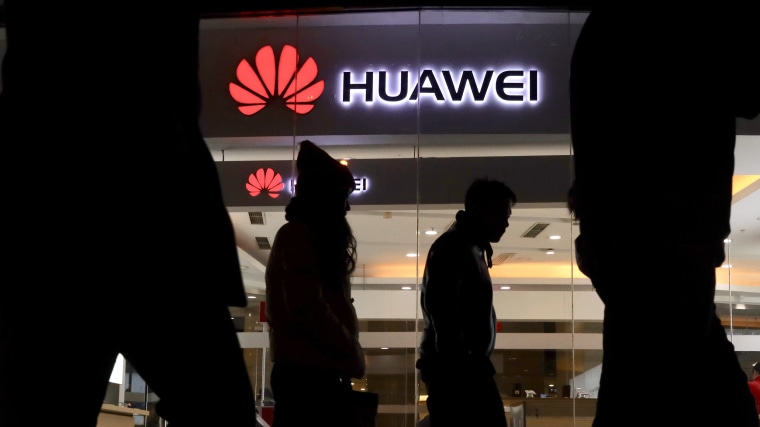The federal indictments announced Monday against Huawei Technologies are part of a larger U.S. campaign against Huawei and other Chinese companies that could have expensive ramifications for security worldwide and for U.S. consumers at home.
Acting Attorney General Mark Whitaker personally announced the pair of grand jury indictments in Washington, signaling the gravity with which the Trump administration regards the cases.
The announcement came as the Trump administration prepares to receive a Chinese trade delegation in Washington this week.
"This is an escalation," said Harrison Van Riper, a cyberintelligence analyst with Digital Shadows Ltd., a digital risk management firm in San Francisco.
"They have a case, and they're ready to bring a case," regardless of the political or trade ramifications, Van Riper said in an interview.
The main money laundering, fraud, conspiracy and obstruction charges at issue in the indictments stem specifically from the allegation that Huawei has tried to evade U.S. sanctions for doing business with Iran. Related to that allegation, the company's chief financial officer, Meng Wanzhou, was detained in Canada last month at the request of the Justice Department.
Huawei said in a statement Tuesday that it was "disappointed" and denied that it or any of its affiliates "have committed any of the asserted violations of U.S. law set forth in each of the indictments."
China's industry ministry told Reuters the indictments were "unfair and immoral."
The indictments are only one part of a larger warning the Justice Department has sounded since Bill Clinton was president — that Huawei and other Chinese telecommunications companies are arms of the Chinese government and that they could plant spyware in communications at the heart of U.S. infrastructure systems like the power grid, the air traffic control network and nuclear plants.
The defense budget bill that President Donald Trump signed in August included a rule banning federal contractors from using telecom equipment made by Huawei and by ZTE, another leading Chinese technology company. U.S. intelligence agencies last year urged Americans not to buy Huawei phones.
Huawei has also consistently denied that it has any ties to the Chinese government — a contention that security and telecommunications experts have long rejected.
"Huawei can act as an arm of the Chinese state," said James Lewis, senior vice president of the Center for Strategic and International Studies, or CSIS, a Washington policy institute.
"If you install this stuff, you become vulnerable to Chinese espionage," Lewis said in a interview. "The government does subsidize Huawei."

The U.S. isn't alone in those concerns. German officials have pressed for serious action against Huawei, especially as the company has assumed a leading role in building 5G infrastructure, the technology behind the next generation of super-fast wireless communications.
A study by the European Commission projected that dominance in 5G could yield a harvest of $130 billion a year and 2.3 million new jobs by 2025. China and the West are racing to win that prize, and if history is any indication, that could lead to competing, incompatible 5G systems — potentially creating headaches for consumers.
Van Riper said he sees a parallel to the diverging adoptions of separate 4G wireless technologies in the last decade: GSM, which is used by most of the world — including T-Mobile and AT&T in the United States — and CDMA, which is used mainly by Verizon Communications and Sprint in the United States.
The division has led to a balkanization of 4G technology, with millions of U.S. users of CDMA devices stranded when they visit other countries or even other parts of the United States where CDMA coverage is weak.
If the dispute stays on its current path, "certain phones and certain countries would go one way, and certain phones and certain countries would go another way" with 5G, Van Riper said. "That would affect a lot of people in the U.S."
In addition, "there's this escalating thing between two sides of the world, where Huawei is being put on blast by both sides," he said, which "adds a geopolitical angle" to the competition.
Huawei is the world's largest maker of telecommunications equipment, and allowing its technology on U.S. systems might make your phone bill go down.
Then again, it might not.
None of the major U.S. carriers use Huawei equipment because of their U.S. government contracts. But many smaller carriers serving rural areas do, said the Rural Wireless Association, which represents small carriers across the country.
Cutting Huawei out of the U.S. market entirely "would irreparably damage existing rural wireless broadband networks, inhibit future wireless broadband deployment in many rural and remote areas throughout the country, and fundamentally fail to effectively protect national security," the group said in a filing last month with the Federal Communications Commission, or FCC.
The FCC is considering a proposal to ban all carriers from using "equipment or service providers identified as posing a national security risk" — meaning Huawei and ZTE. (Huawei is an associate member of the Rural Wireless Association and has sponsored some of its programs and seminars.)
The Rural Wireless Association said the potential cost of the proposed requirement literally can't be calculated, and it complained that "the commission's rule does not include any sort of financial support to assist affected small carriers in removing and replacing prohibited equipment."
But Lewis stressed that if the U.S. doesn't take comprehensive action, the ramifications for infrastructural systems like transportation, aviation and electric power would be profound.
You wouldn't even need to buy Huawei equipment, he said — "the Chinese would give it to us for free because the intelligence advantage is so great."


